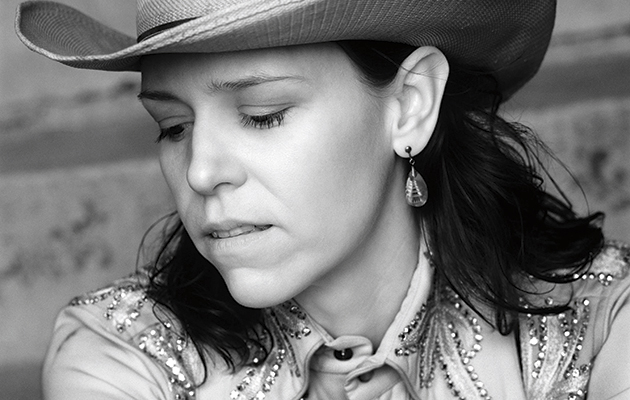John Mulvey joins Gillian Welch and David Rawlings in Nashville in the lead-up to the release of The Harrow And The Harvest. Topics up for discussion include the torturous process of writing a song, their stunning back catalogue and why they’re terrible at being traditional musicians. Originally published in Uncut’s August 2011 issue (Take 171).
_________________________
In the second week of May, Gillian Welch and David Rawlings drove from Los Angeles to Nashville. The journey took 31 hours, and Welch filmed a small portion of it on her iPhone. The clip is framed by an open car window, and outside you can see the flooded Mississippi stretching away from the edge of the road to the horizon: a new inland sea for the beleaguered American South.
The car radio is audible in the background, tuned to a digital station that plays nothing but The Grateful Dead. As Welch and Rawlings speed through this submerged part of Arkansas along the I-40 highway, the station is broadcasting, with at least partial serendipity, “Rain And Snow”. When they reach the Tennessee state line, “Tennessee Jed” will be on the air.
This epic journey has become a routine for the couple; in the past year, they have crossed the States by car ten times. Rawlings has developed a “terrible phobia” of flying and, while it has been eight years since the duo released an album under Welch’s name, work on The Harrow And The Harvest has ended in something of a rush, precipitating a good few concentrated expeditions through the southern states. This time, after last-minute adjustments to the mastering and the artwork, they left their apartment in LA on Monday and arrived back at their Nashville base around midnight on Wednesday.
“Travel is much more enjoyable by car,” explains Welch, sitting in the lobby of Woodland Studios, their expansive Nashville complex, “and it’s contributed to this record immensely. There’s the tremendous freedom when you get in the car and drive. Dave put it rather nicely: he had this feeling of gathering weight – mental weight, personal weight – whereas when you fly, you dissipate. You switch off in a bad way, and that’s really bad for both of our brains.
“I mean, I’m doing everything I can to not switch off. We live in a fairly isolated world – our band is very small, our world is very small – and so I actually struggle to remain of the world. It’s way easier for me to separate, but when I drive I’m confronted by beautiful language and poetry constantly in the shape of highway signs and town names. I’m confronted by history, to a shocking degree.
“We drove in this time on I-40, and we spent a solid eight hours driving through the Cherokee nation and the Seminole nation and the Creek nation, and then we hit the Mississippi and it was flooded three miles over its bank. I’m aware that people feel really dislocated most of the time from events that occur in folk songs, but I’m just here to tell you it’s not any different. What did I encounter on my drive? I hit a dust storm and a flood, y’know?”
Between 1996 and 2003, Gillian Welch and David Rawlings released four albums – 39 original songs, plus two covers – and appeared on the soundtrack of O Brother, Where Art Thou?, which has sold seven and a half million copies in the States alone. It’s a small body of work, but a powerful one, in the way it makes vital new art from the bones of tradition, with a clarity and lack of ostentation that borders on the uncanny.
Much of Welch’s music features little more than her calm, authoritative voice following the strum of her guitar, while Rawlings harmonises and improvises around her. They are a totally collaborative duo, who use the name of their lead singer as a convenient brand name. “You get the sense that there’s a direct channel between her heart and her lips,” says an admiring Colin Meloy, who employed Welch to sing backup on the last Decemberists album, The King Is Dead. “I don’t think the girl has an oesophagus – she’s got some kind of weird, fleshy soul-conduit.”
Welch and Rawlings’ albums are beautiful and potent, and they often wish this music could stand totally apart from their personal histories. “I would’ve loved to see what happened if our records had come out and people knew nothing about who we were,” says Rawlings.
But their backstory has rankled with some country fans ever since Welch’s debut, Revival, appeared in 1996. For those hung up on unrealistic notions of authenticity, it grated to hear Welch sing of leasing “20 acres and one Ginny mule from the Alabama trust”. She was, after all, the adopted daughter of an LA showbiz family who had met Rawlings in the cloistered environment of Boston’s Berklee School Of Music.
Mostly, Welch is irritated by the supposed disparity between her music and her upbringing. But sometimes it puzzles even her why she has always been so attracted to old folk songs, predominantly from the American South. Around the time of 2003’s Soul Journey, she discovered that her unnamed birth mother was an Appalachian girl studying in New York, and began speculating that her father could have been a musician – Levon Helm, perhaps, or Bill Monroe – passing through town. “It was interesting how much it confused things,” says Rawlings, who occasionally speaks for his partner on awkward subjects. “Because then,” he turns to Welch, “you don’t even know whether you’re on the nature or nurture side of the argument.”
She laughs. “I don’t even know what team I’m on!”


